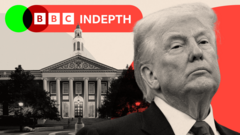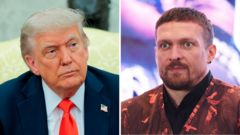Over the past week, Trump has aggressively targeted Harvard University, threatening funding and pushing for a re-evaluation of contracts, exemplifying a struggle between his administration and elite educational institutions. This strategy may symbolize a conservative movement aiming to reshape American higher education's cultural and political ideologies.
The Enduring Impact of Trump's Assault on Higher Education

The Enduring Impact of Trump's Assault on Higher Education
Trump's recent actions against Harvard reflect a broader campaign targeting elite universities, igniting debates over academic freedom and the political landscape in America.
In a sweeping escalation in his ongoing feud with prestigious educational institutions, Donald Trump recently directed his ire at Harvard University, threatening to redirect billions in federal funding and pushing for investigations into its operations. These actions, which some see as a decisive maneuver to influence the cultural and political direction of higher education, have unveiled a stark divide within American society over academic governance.
Starting on Monday, Trump's administration announced plans to reroute $3 billion in research funding typically granted to Harvard, suggesting that these funds could be better allocated to vocational schools. The following day, the White House instructed federal agencies to assess more than $100 million in contracts awarded to Harvard, looking to identify alternative vendors and options. Trump claimed during a press briefing, “Harvard is treating our country with great disrespect, and all they're doing is getting in deeper."
This barrage of directives, combined with a freeze on research grants and actions surrounding foreign students, paints a picture of a strategic assault on one of America’s oldest and wealthiest institutions. According to Greg Wolfson from the American Association of University Professors, the ramifications across the academic sector are profound: "They're changing the culture. They're changing people," he said, highlighting the climate of fear and uncertainty now gripping many campuses.
At Harvard's commencement ceremonies, graduates expressed palpable concern over these developments. “If this can happen to Harvard, it can happen to any university in the country,” one graduate remarked, emphasizing a collective shock as the situation unfolded.
Trump's consolidation of power over education echoes a broader strategy to undermine traditional Democratic strongholds by targeting liberal-leaning academic institutions. The administration has justified its actions through accusations of bias and alleged antisemitism on college campuses, particularly in light of recent anti-Israel protests. The previous Harvard president’s ambivalence in addressing antisemitism during congressional testimony further fueled these attacks.
However, critics argue that these actions are symptomatic of a larger war to reshape higher education in line with conservative values, as universities have long been viewed as bastions of liberal ideology. Some conservative figures, like Charlie Kirk, argue that educational institutions have strayed from their primary mission of knowledge pursuit in favor of promoting leftist agendas.
Over the years, growing ties between academia and government have increasingly made universities reliant on federal funding, creating vulnerabilities that the Trump administration has now exploited. As higher education finds itself under siege from the very entities that fund it, the dynamic between academic freedom and governmental oversight is being radically transformed.
Despite Harvard's resistance and legal actions to contest these overly ambitious demands—including a recent court ruling suspending the administration's visa restrictions on foreign students—the conflict represents a broader ideological struggle. Should academic institutions capitulate to governmental pressure, it could initiate long-lasting changes to the academic landscape in America.
As poll results indicate a significant divide in perceptions of Trump’s educational policies, many within academia fear a growing culture of self-censorship in the face of potential retaliation from the government. Wolfson stressed, “The destruction is real. Even if the courts step in, there will still be a massive undermining of the higher education project in this country.”
What remains uncertain is whether Trump's initiatives will achieve their goal of fostering a conservative-friendly educational environment or merely expose the vulnerabilities of American universities amidst a tumultuous political climate. Regardless of the outcome, the ivory tower has been breached, with a clear message sent that higher education is not immune to the churning tides of American politics.





















